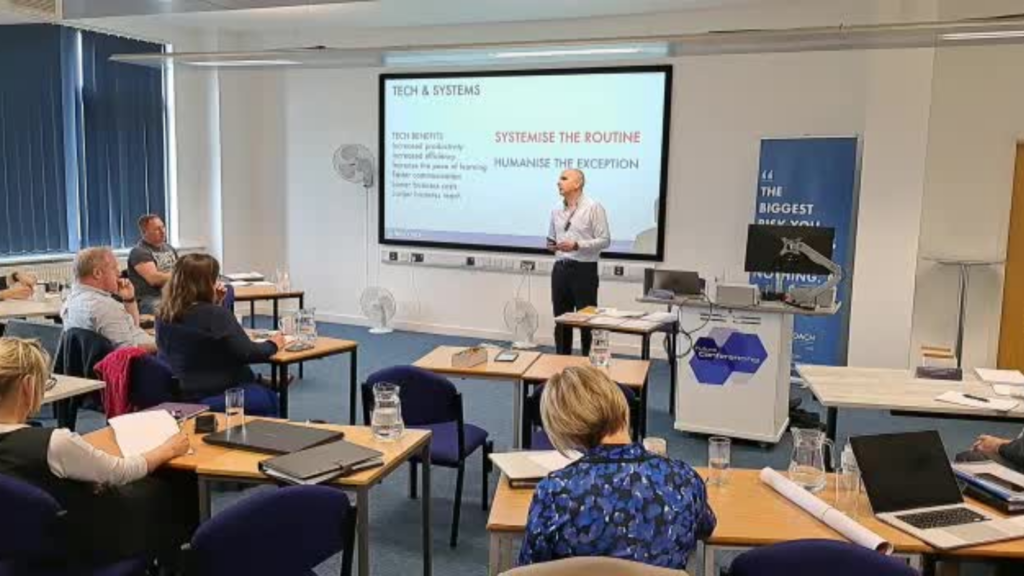What are the priorities managers need for effective team management?
Good management is essential for the success of any organization, but it’s not always easy to get right. As a manager, you need to balance the needs of your team members with the goals of the organization, while also dealing with unexpected challenges and competing priorities. In this blog, we’ll explore 13 essential skills for good management, ranging from creating clear roles and responsibilities to fostering a sense of purpose and growth. By mastering these skills, you can create a culture of engagement, productivity, and continuous improvement, while also building strong relationships with your team members and achieving your organization’s goals.
This was a key topic in our most recent GrowthCLUB quarterly planning day – and we covered 13 key areas of management that are essential for good teams. Why the term “management” became so vilified in the 80s/90s is a bit of a mystery, as people flocked towards the concept of “leadership” being more inspirational and aspirational… The fact of the matter is that systems run the business, the team run the systems, so therefore good management leads to a better team implementing and improving the systems to optimise the business.
So, let’s dive in and explore what it takes to be a great manager.

Clear, written, discussed, shared roles and responsibilities
Clear communication is key to effective management. One of the most important aspects of communication is defining clear roles and responsibilities for each team member. A manager should ensure that these roles and responsibilities are not only defined in writing but also discussed and shared with the team. This way, everyone on the team understands their individual responsibilities and how they contribute to the overall success of the team. Clear roles and responsibilities help to avoid confusion, reduce duplication of effort, and enable team members to work together more effectively. It is the responsibility of the manager to ensure that every team member understands their role and that each member’s role is clearly defined and communicated.
Create a clear line of sight
As a manager, it is important to create a clear line of sight between the organization’s goals and the day-to-day work of your team. A clear line of sight means that each team member understands how their work contributes to the overall goals of the organization. It is the manager’s responsibility to ensure that each team member has a clear understanding of the organization’s goals and how their work contributes to achieving those goals. By creating a clear line of sight, a manager can motivate their team and help them feel a sense of purpose in their work. This, in turn, can lead to increased engagement, productivity, and job satisfaction. A clear line of sight is essential for creating a high-performing team.
Work the team… then work the problem
As a manager, it’s important to focus on both your team and the problems you need to solve. However, it’s critical to remember that your team is your most important asset. Before you focus on solving any problems, you should ensure that your team is functioning well and has the resources they need to succeed. This means getting to know your team members, building relationships, and understanding their strengths and weaknesses. By doing this, you can build trust and create an environment where team members feel comfortable discussing problems and working collaboratively to find solutions. Once you have a strong team in place, you can focus on solving problems together. This approach ensures that everyone is invested in finding the best solutions and that the team works together effectively.
One very key focus for managers when encountering issues is: Blame the process, NOT the person!
The wellbeing and success of your team
A manager’s role is not just to deliver results, but also to ensure the wellbeing and success of their team members. A manager should prioritize the wellbeing of their team members by providing support and resources to help them manage their workload and maintain a healthy work-life balance. This can include things like flexible work arrangements, mental health resources, and opportunities for personal and professional development. By prioritizing the wellbeing of team members, a manager can create a positive work environment that fosters collaboration, innovation, and high performance. Additionally, a manager should work to support the success of their team members by providing opportunities for growth and recognizing and rewarding good work. This approach helps to build trust and loyalty among team members, leading to a more engaged and committed team.
1:1s are to help your team grow. Prepare for them and be generous with your time
One-on-one meetings (1:1s) are a critical tool for managers to help their team members grow and develop. To make the most of these meetings, it’s important to prepare for them in advance and be generous with your time. Before the meeting, take some time to review the team member’s performance, identify areas where they could improve, and think about ways to support their growth. During the meeting, give the team member your full attention and listen actively to their feedback, concerns, and ideas. Encourage them to share their goals and aspirations, and work with them to create a plan to achieve those goals. By being generous with your time, you show your team members that you value them and are committed to their growth and development. This, in turn, helps to build trust and loyalty, and creates a more engaged and motivated team.
Confront the elephant – embrace it and own it
When problems or conflicts arise within a team, it’s important to confront them head-on. This means acknowledging the “elephant in the room” and taking ownership of the issue. By doing this, a manager can create a safe and supportive environment where team members feel comfortable discussing problems openly and honestly. Embracing the elephant also means acknowledging your own mistakes and taking responsibility for your actions. This helps to build trust and credibility with your team members, and shows that you are committed to finding the best solutions for the team. Additionally, confronting the elephant can help to prevent small problems from escalating into larger issues that can negatively impact team performance. As a manager, it’s important to be proactive in addressing problems and conflicts, and to create a culture of openness and transparency where issues can be discussed and resolved constructively.
Listening is the number 1 skill in reducing resistance
Listening is one of the most important skills a manager can have when it comes to reducing resistance within their team. When team members feel that their concerns and feedback are heard and valued, they are more likely to be receptive to change and to work collaboratively towards shared goals. As a manager, it’s important to actively listen to your team members, ask questions, and seek to understand their perspectives. This means putting aside your own assumptions and biases and truly engaging with what they are saying. By doing this, you can build trust and create a positive work environment where team members feel comfortable sharing their ideas and concerns. Additionally, active listening can help you to identify potential roadblocks and areas for improvement, and to develop more effective strategies for overcoming resistance and achieving your goals.
Believe in your people more than they do… and help to instil courage
As a manager, it’s important to believe in your team members and to help instill courage in them. This means recognizing their strengths and potential, even when they may not see it themselves, and providing them with opportunities to develop and grow. By believing in your team members, you can help to build their confidence and inspire them to take on new challenges and stretch themselves beyond their comfort zones. Additionally, instilling courage means providing constructive feedback and coaching to help them overcome obstacles and achieve their goals. By doing this, you can create a supportive and empowering work environment where team members feel valued, motivated, and engaged. When team members have the courage to take risks and try new things, they are more likely to innovate and drive positive change within the organization.
Encourage your people to be themselves. Unity but not uniformity
As a manager, it’s important to encourage your team members to be themselves and to embrace their unique perspectives and ideas. This means recognizing and valuing diversity within the team and creating a culture that promotes unity without uniformity. By allowing team members to bring their whole selves to work, you can create a more inclusive and welcoming environment where everyone feels respected and valued. Additionally, by embracing diversity, you can tap into a wider range of ideas and perspectives, which can lead to more creative and innovative solutions. Encouraging your team members to be themselves also means promoting a growth mindset, where mistakes are viewed as opportunities for learning and development rather than as failures. By doing this, you can create a culture of continuous improvement and encourage your team members to take risks and try new things.
People who feel good about themselves perform better – MMFISH: Make me feel important, safe and happy
It’s been shown that people who feel good about themselves perform better, and as a manager, it’s your responsibility to create an environment where your team members can thrive. The MMFISH acronym – Make Me Feel Important, Safe, and Happy – is a helpful reminder of the key elements that contribute to a positive work environment. Making team members feel important means recognizing and valuing their contributions, and providing them with opportunities to develop and grow. Creating a safe environment means providing support and resources to help team members feel secure and confident in their work. Finally, promoting happiness means fostering a culture that promotes work-life balance, recognizes achievements, and celebrates successes. By prioritizing these elements, you can create a workplace culture that promotes well-being, engagement, and high performance.
What you measure gets done. What you reward gets done again
As a manager, it’s important to remember the adage, “What you measure gets done. What you reward gets done again.” This means that the metrics you use to evaluate performance, as well as the incentives and rewards you offer, can have a significant impact on team behavior and outcomes. Therefore, it’s important to carefully choose the metrics you use to track progress and to align them with your team’s goals and values. Additionally, it’s important to reward behaviors that contribute to success and to avoid rewarding behaviors that may have negative consequences in the long term. By doing this, you can create a culture of continuous improvement and motivate your team members to achieve their best work. Finally, it’s important to ensure that your metrics and incentives align with your overall mission and values, to ensure that your team is working towards a shared vision of success.
Remind, remind, remind. 20:60:80
As a manager, it’s important to communicate expectations clearly and consistently, to ensure that everyone on the team is aligned and working towards the same goals. Additionally, it’s important to ensure that communication is two-way, and that team members feel comfortable asking questions and providing feedback. By doing this, you can create a culture of transparency and accountability, where everyone feels empowered to contribute to the team’s success. Finally, it’s important to ensure that your communication aligns with your team’s goals and values, to ensure that everyone is working towards a shared vision of success.
By checking in with the person responsible for a task 20%, 60% and 80% of the way through a project (simply put, Monday, Wednesday and Thursday for a project that is due on Friday) then the person will be reminded sufficiently AND given the space to raise issues that are blocking the project, and you have made yourself available to support.
When you are working for something bigger than you… you grow
As a manager, it’s important to help your team members connect their work to a larger purpose or mission, to foster a sense of fulfilment and meaning. When team members feel like they are working towards something bigger than themselves, they are more likely to be motivated, engaged, and committed to their work. Additionally, working towards a larger goal can help team members develop new skills and abilities, as they are forced to stretch beyond their comfort zones and take on new challenges. By fostering a sense of purpose and encouraging growth, you can create a culture that promotes continuous learning and development. Additionally, connecting your team’s work to a larger mission or purpose can help to build a sense of community and shared identity, as everyone works together towards a common goal. Finally, by helping team members to see the impact of their work on the world around them, you can promote a sense of pride and ownership, which can lead to even greater levels of engagement and commitment.
Final thoughts
In conclusion, good management requires a combination of skills, including clear communication, active listening, empathy, and a commitment to growth and purpose. By creating a culture of trust, transparency, and accountability, you can foster an environment where team members feel valued and motivated, and are empowered to contribute to the success of the organization. While there are many challenges associated with management, mastering these essential skills can help you to overcome them and achieve great results. So, whether you’re a seasoned manager or just starting out, we hope that these 13 skills will help you to become a more effective leader and build a high-performing team.
Want to go further?
Why not head over and watch ActionCOACH founder Brad Sugars talking about Leadership and Management in this 1-hour video.
As well as this, we always make our offer available to all: Have a completely complimentary, no obligations coaching session on the subject of management with a qualified ActionCOACH. Contact Andi Davies to get it set up.





